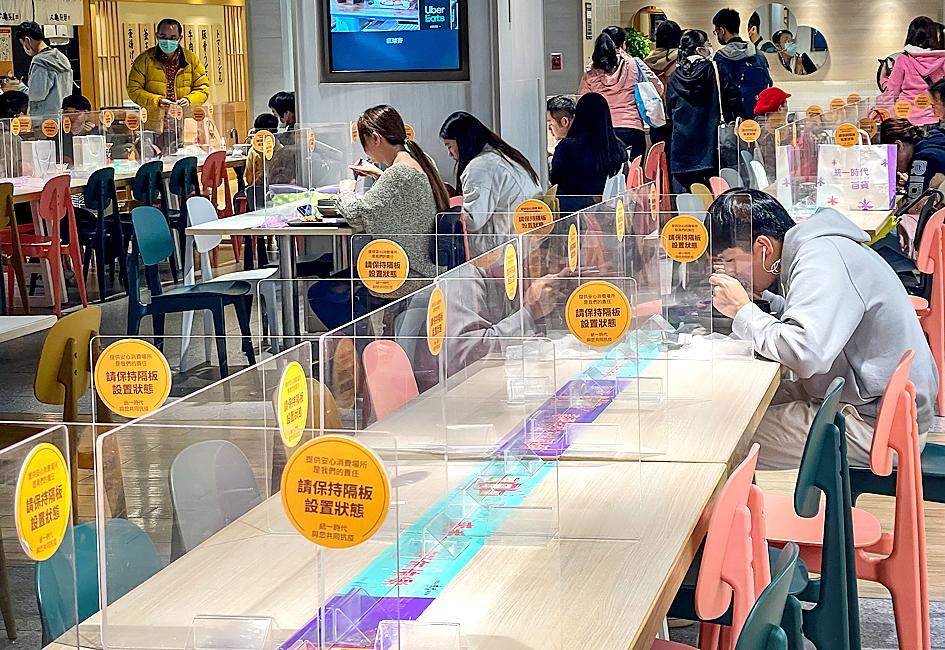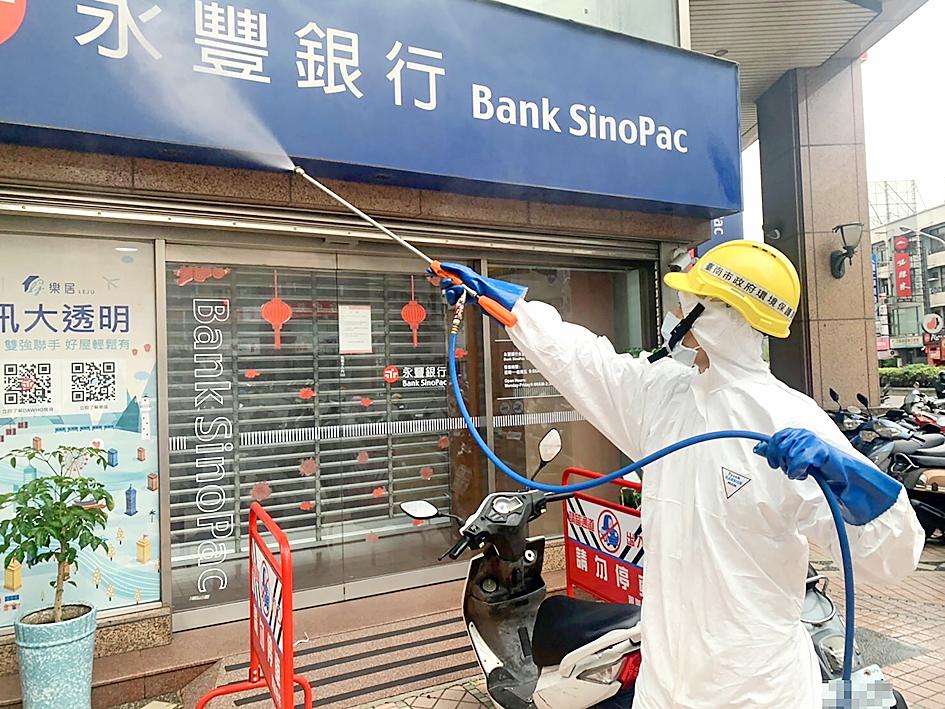Taipei Mayor Ko Wen-je (柯文哲) yesterday announced that the city is raising its COVID-19 alert level to 2.5, with a conditional ban on dine-in services.
People who have received two or three shots against COVID-19 can dine in at eateries, while those who have not been vaccinated or have only received one jab should only eat on-site if there are isolation booths, he told a news conference.
Ko said he is not thinking of raising the alert level to 3, as Taiwan has a relatively high vaccination rate and vaccinated people are less likely to spread the virus.

Photo: CNA
Taipei residents are advised to voluntarily abstain from dining in, which remains a high-risk activity, he said.
During the level 2.5 period, people can dine in if they have received their second dose at least 14 days before, while those who have not should order takeout or delivery, he said.
The measures are advisory for now, as the city hopes that the partial restrictions on indoor dining would encourage people to behave responsibly, he said, adding that more forceful measures might be imposed if compliance is low.

Photo courtesy of the Tainan City Government via CNA
Asked about dining regulations for children aged 12 or younger, Ko said that they can dine in if they are accompanied by a parent.
The Central Epidemic Command Center (CECC) on Monday extended the nation’s level 2 COVID-19 alert to Feb. 7, meaning that people are still required to wear masks outside their homes, unless they are eating, or if they are in outdoor spaces with very few people, such as in forests or fields.
Asked about Ko’s announcement, Minister of Health and Welfare Chen Shih-chung (陳時中), who heads the center, said that so long as the alert level is within the level 2 range, local governments can raise it to a level they see fit, be it level 2.5, 2.6 or 2.4, and that the public must abide by the regulations.
The CECC yesterday reported 71 new COVID-19 infections: 27 domestic and 44 imported cases.
Most of the new locally transmitted cases were linked to known clusters in Taoyuan, Kaohsiung and Yilan County, or isolated cases in a New Taipei City hospital, Chen said.
However, there are three confirmed cases whose sources of infections are still being investigated, including two Taoyuan residents in Bade District (八德), who took the test at COVID-19 testing sites in the city, and an Indian national, who took the test for a trip abroad, Chen said.
Twelve of the 27 local cases are breakthrough infections, while seven are children younger than 10 who are not eligible for vaccination against COVID-19 in Taiwan. Two received one dose each of the Pfizer-BioNTech vaccine, one is unvaccinated and the status of the remaining five has yet to be determined, the CECC said.
The center did not release information on the vaccination status of the imported cases.

Beijing could eventually see a full amphibious invasion of Taiwan as the only "prudent" way to bring about unification, the US Department of Defense said in a newly released annual report to Congress. The Pentagon's "Annual Report to Congress: Military and Security Developments Involving the People's Republic of China 2025," was in many ways similar to last year’s report but reorganized the analysis of the options China has to take over Taiwan. Generally, according to the report, Chinese leaders view the People's Liberation Army's (PLA) capabilities for a Taiwan campaign as improving, but they remain uncertain about its readiness to successfully seize

Taiwan is getting a day off on Christmas for the first time in 25 years. The change comes after opposition parties passed a law earlier this year to add or restore five public holidays, including Constitution Day, which falls on today, Dec. 25. The day marks the 1947 adoption of the constitution of the Republic of China, as the government in Taipei is formally known. Back then the Chinese Nationalist Party (KMT) governed China from Nanjing. When the KMT, now an opposition party in Taiwan, passed the legislation on holidays, it said that they would help “commemorate the history of national development.” That

HORROR STORIES: One victim recounted not realizing they had been stabbed and seeing people bleeding, while another recalled breaking down in tears after fleeing A man on Friday died after he tried to fight the knife-wielding suspect who went on a stabbing spree near two of Taipei’s busiest metro stations, Taipei Mayor Chiang Wan-an (蔣萬安) said. The 57-year-old man, identified by his family name, Yu (余), encountered the suspect at Exit M7 of Taipei Main Station and immediately tried to stop him, but was fatally wounded and later died, Chiang said, calling the incident “heartbreaking.” Yu’s family would receive at least NT$5 million (US$158,584) in compensation through the Taipei Rapid Transit Corp’s (TRTC) insurance coverage, he said after convening an emergency security response meeting yesterday morning. National

Taiwan has overtaken South Korea this year in per capita income for the first time in 23 years, IMF data showed. Per capita income is a nation’s GDP divided by the total population, used to compare average wealth levels across countries. Taiwan also beat Japan this year on per capita income, after surpassing it for the first time last year, US magazine Newsweek reported yesterday. Across Asia, Taiwan ranked fourth for per capita income at US$37,827 this year due to sustained economic growth, the report said. In the top three spots were Singapore, Macau and Hong Kong, it said. South